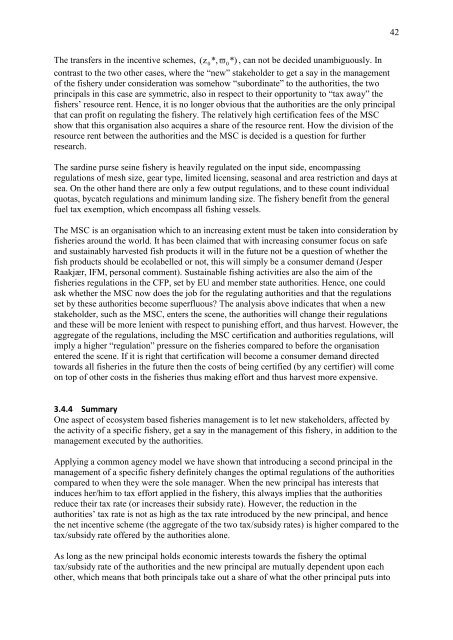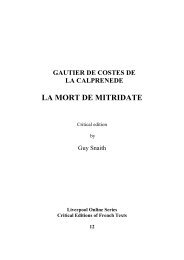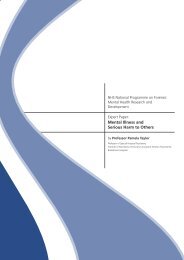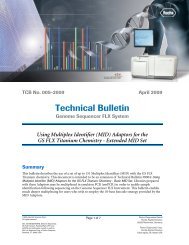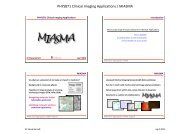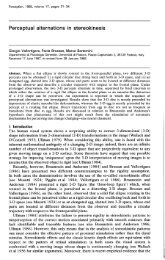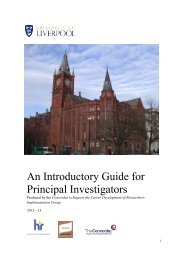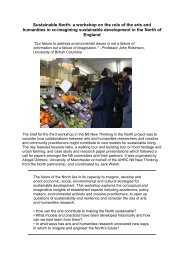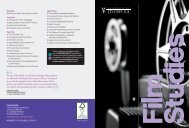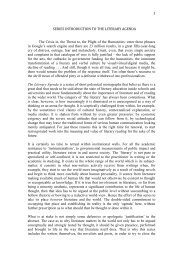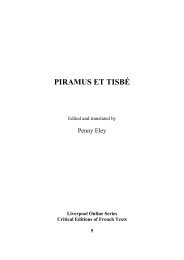Operational tools and adaptive management
Operational tools and adaptive management
Operational tools and adaptive management
Create successful ePaper yourself
Turn your PDF publications into a flip-book with our unique Google optimized e-Paper software.
The transfers in the incentive schemes, ( z0<br />
*, 0*)<br />
, can not be decided unambiguously. In<br />
contrast to the two other cases, where the “new” stakeholder to get a say in the <strong>management</strong><br />
of the fishery under consideration was somehow “subordinate” to the authorities, the two<br />
principals in this case are symmetric, also in respect to their opportunity to “tax away” the<br />
fishers‟ resource rent. Hence, it is no longer obvious that the authorities are the only principal<br />
that can profit on regulating the fishery. The relatively high certification fees of the MSC<br />
show that this organisation also acquires a share of the resource rent. How the division of the<br />
resource rent between the authorities <strong>and</strong> the MSC is decided is a question for further<br />
research.<br />
The sardine purse seine fishery is heavily regulated on the input side, encompassing<br />
regulations of mesh size, gear type, limited licensing, seasonal <strong>and</strong> area restriction <strong>and</strong> days at<br />
sea. On the other h<strong>and</strong> there are only a few output regulations, <strong>and</strong> to these count individual<br />
quotas, bycatch regulations <strong>and</strong> minimum l<strong>and</strong>ing size. The fishery benefit from the general<br />
fuel tax exemption, which encompass all fishing vessels.<br />
The MSC is an organisation which to an increasing extent must be taken into consideration by<br />
fisheries around the world. It has been claimed that with increasing consumer focus on safe<br />
<strong>and</strong> sustainably harvested fish products it will in the future not be a question of whether the<br />
fish products should be ecolabelled or not, this will simply be a consumer dem<strong>and</strong> (Jesper<br />
Raakjær, IFM, personal comment). Sustainable fishing activities are also the aim of the<br />
fisheries regulations in the CFP, set by EU <strong>and</strong> member state authorities. Hence, one could<br />
ask whether the MSC now does the job for the regulating authorities <strong>and</strong> that the regulations<br />
set by these authorities become superfluous? The analysis above indicates that when a new<br />
stakeholder, such as the MSC, enters the scene, the authorities will change their regulations<br />
<strong>and</strong> these will be more lenient with respect to punishing effort, <strong>and</strong> thus harvest. However, the<br />
aggregate of the regulations, including the MSC certification <strong>and</strong> authorities regulations, will<br />
imply a higher “regulation” pressure on the fisheries compared to before the organisation<br />
entered the scene. If it is right that certification will become a consumer dem<strong>and</strong> directed<br />
towards all fisheries in the future then the costs of being certified (by any certifier) will come<br />
on top of other costs in the fisheries thus making effort <strong>and</strong> thus harvest more expensive.<br />
3.4.4 Summary<br />
One aspect of ecosystem based fisheries <strong>management</strong> is to let new stakeholders, affected by<br />
the activity of a specific fishery, get a say in the <strong>management</strong> of this fishery, in addition to the<br />
<strong>management</strong> executed by the authorities.<br />
Applying a common agency model we have shown that introducing a second principal in the<br />
<strong>management</strong> of a specific fishery definitely changes the optimal regulations of the authorities<br />
compared to when they were the sole manager. When the new principal has interests that<br />
induces her/him to tax effort applied in the fishery, this always implies that the authorities<br />
reduce their tax rate (or increases their subsidy rate). However, the reduction in the<br />
authorities‟ tax rate is not as high as the tax rate introduced by the new principal, <strong>and</strong> hence<br />
the net incentive scheme (the aggregate of the two tax/subsidy rates) is higher compared to the<br />
tax/subsidy rate offered by the authorities alone.<br />
As long as the new principal holds economic interests towards the fishery the optimal<br />
tax/subsidy rate of the authorities <strong>and</strong> the new principal are mutually dependent upon each<br />
other, which means that both principals take out a share of what the other principal puts into<br />
42


